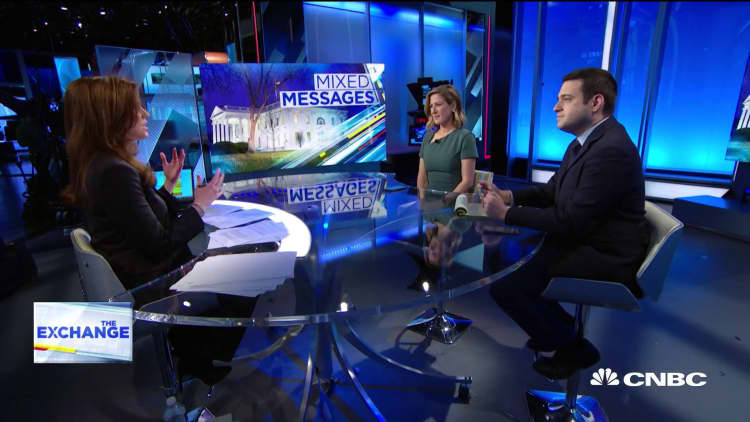Outside groups are laying the groundwork for the eventual Democratic nominee for president as candidates spend millions to duke it out in primaries across the country.
Interviews with leaders of the organizations show that while Democrats are focused on battling each other, there are organizations spending millions of dollars on advertisements, mobile apps, research and grassroots get-out-the-vote efforts.
Many of these teams are run by women with years of experience and extensive resumes that include working in President Barack Obama's administration, campaign fundraising and ad production.
Tara McGowan, founder of nonprofit group Acronym, has decided to invest $75 million into digital ads to take on President Donald Trump. The idea is to focus on young, often low-turnout voters in order to have them go into the general election with the mindset that they should vote against the current commander in chief.
The goal, she said, is to be a backstop for a party that, because of the primary race, is limited in its ability to focus its efforts on aggressively blasting Trump through digital platforms that are often used by younger voters. The nonprofit and its sister super PAC, Pacronym, are targeting potential election participants in the battleground states of Arizona, Michigan, North Carolina, Pennsylvania and Wisconsin.
"Their focus has to be with competing against each other in states for the most part that are pretty decidedly red or blue," McGowan said, referring to the candidates competing in primary elections. "They are living dollar for dollar, unless you're Mike Bloomberg."
Bloomberg, a former New York mayor with a net worth of about $60 billion, is going up against Sen. Bernie Sanders, I-Vt., former vice president Joe Biden and Sen. Elizabeth Warren, D-Mass. The campaign of Rep. Tulsi Gabbard, D-Hawaii, is largely a nonfactor in the race. Former South Bend, Indiana, Mayor Pete Buttigieg and Sen. Amy Klobuchar, D-Minn., dropped out Sunday and Monday, respectively, after being wiped out in Saturday's South Carolina primary.
With the exception of Sanders and Bloomberg, candidates have struggled at times to have enough campaign cash for major investments into TV and digital ads, particularly as it pertains to Super Tuesday states that are set to vote on March 3.
A recent study by Advertising Analytics, a firm that tracks how much campaigns are spending on advertisements during elections, said ad spending in the 2020 election cycle has already hit over $1 billion with at least $247 million being dropped into Super Tuesday states, including the delegate-rich contests taking place in Texas, California and North Carolina.
Bloomberg has spent over $113 million in the Golden State, followed by Sanders and Tom Steyer, another billionaire, who dropped out Saturday after failing to capture a single delegate in South Carolina. Sanders leads his competitors in California, according to a Real Clear Politics polling average.
Beyond the ads, outside organizations are also publishing and distributing polls, with the hope that Democratic candidates will make it a priority to appeal to Latino voters as a way of defeating Trump in November.
Equis Labs, a research group dedicated to polling Latino voters, has been surveying thousands of possible election participants in key primary states, such as North Carolina, Virginia, Arizona and Texas, according to the group's co-founder, Stephanie Valencia.
The Equis polls show that Latina women have turned against Trump but that older Latino men could pose a problem for Democrats.
"Latinas are very anti-Trump, while older Latino men are softer to the president, especially on the economy," Valencia said in an interview. "That doesn't mean they are excusing his behavior on immigration or excused his moral behavior, but they are open to hearing his message on the economy," she added.
Since the start of his administration, Trump has often proposed policies that could hinder the lives of Latinos. He's pushed for the building of a wall between the U.S. and Mexico. Trump has yet to address the status of young undocumented immigrants known as Dreamers.
In a new poll provided to CNBC, recent Equis polling in Texas shows Sanders with the largest edge over Trump when it comes to Latino voters. He's followed by Bloomberg, Biden and Warren.
With similar surveys pointing to an opportunity for Democrats to see a surge in Latino voter support in 2020, groups such as Vote Latino, a 501(c)(4) nonprofit, are ramping up their efforts to register young Latinos in key states across the country.
Vote Latino's CEO, Maria Teresa Kumar, told CNBC in an interview that the group started the year with $3.5 million on hand and has so far raised $11.5 million, with the goal of finishing the cycle bringing in $15 million. It focuses most of its resources on digital ads.
So far Vote Latino has registered more than 75,000 Latino voters, with the overall targets being English-speaking young Latinos in Wisconsin, Pennsylvania, North Carolina, Virginia, Texas, Georgia, Arizona, Nevada and Colorado. The group hopes to register up to 500,000 by Election Day in November.
Vote Latino spent just under $200,000 developing a voter registration app titled VoterPal and has started doing promotions through clothing company Steve Madden and ride-hailing service Lyft. The group is also in negotiations with NBA teams to help push the brand to voters.
Kumar said that similar to other organizations, Vote Latino is making these efforts while many Democrats running for president aren't successfully connecting with Latino voters, something she has privately told various candidates in the primary.
"I think they have not taken into account more modern means of communication. I think they are running their playbook in 2008," she said on Monday. "Social media has created a system where you have to connect with voters all the time. ... It's not good enough to say that when you get to Texas you'll speak to them then."
Kumar said candidates have to do a better job speaking to young Latinos about what she says is their biggest fear: a second Trump term.



